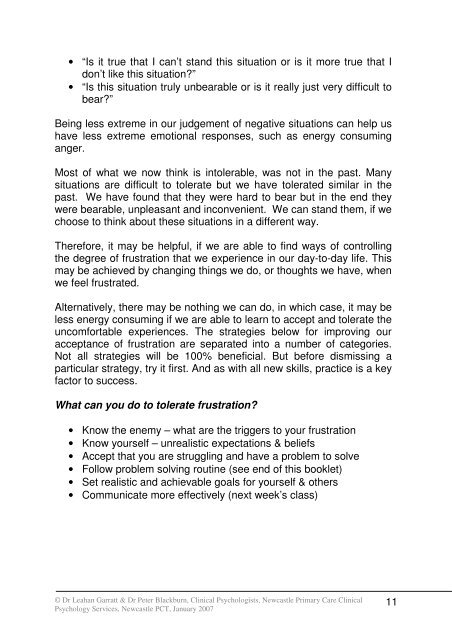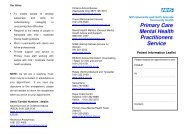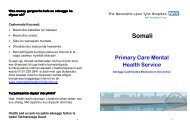Anger Management Course Workbook - Newcastle Psychological ...
Anger Management Course Workbook - Newcastle Psychological ...
Anger Management Course Workbook - Newcastle Psychological ...
You also want an ePaper? Increase the reach of your titles
YUMPU automatically turns print PDFs into web optimized ePapers that Google loves.
• “Is it true that I can’t stand this situation or is it more true that I<br />
don’t like this situation?”<br />
• “Is this situation truly unbearable or is it really just very difficult to<br />
bear?”<br />
Being less extreme in our judgement of negative situations can help us<br />
have less extreme emotional responses, such as energy consuming<br />
anger.<br />
Most of what we now think is intolerable, was not in the past. Many<br />
situations are difficult to tolerate but we have tolerated similar in the<br />
past. We have found that they were hard to bear but in the end they<br />
were bearable, unpleasant and inconvenient. We can stand them, if we<br />
choose to think about these situations in a different way.<br />
Therefore, it may be helpful, if we are able to find ways of controlling<br />
the degree of frustration that we experience in our day-to-day life. This<br />
may be achieved by changing things we do, or thoughts we have, when<br />
we feel frustrated.<br />
Alternatively, there may be nothing we can do, in which case, it may be<br />
less energy consuming if we are able to learn to accept and tolerate the<br />
uncomfortable experiences. The strategies below for improving our<br />
acceptance of frustration are separated into a number of categories.<br />
Not all strategies will be 100% beneficial. But before dismissing a<br />
particular strategy, try it first. And as with all new skills, practice is a key<br />
factor to success.<br />
What can you do to tolerate frustration?<br />
• Know the enemy – what are the triggers to your frustration<br />
• Know yourself – unrealistic expectations & beliefs<br />
• Accept that you are struggling and have a problem to solve<br />
• Follow problem solving routine (see end of this booklet)<br />
• Set realistic and achievable goals for yourself & others<br />
• Communicate more effectively (next week’s class)<br />
© Dr Leahan Garratt & Dr Peter Blackburn, Clinical Psychologists, <strong>Newcastle</strong> Primary Care Clinical<br />
Psychology Services, <strong>Newcastle</strong> PCT, January 2007<br />
11






